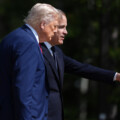Review of: The Tragic Mind: Fear, Fate, and the Burden of Power
Author: Robert D. Kaplan
Publisher: Yale University Press 2023
If anyone is qualified to talk about war and conflict, it’s Robert Kaplan and his forty years as a foreign correspondent. He is on everyone’s list of top policy thinkers and has written 20 books to back up his reputation. He has now added another, The Tragic Mind: Fear, Fate, and the Burden of Power, his most personal book.
The Tragic Mind is about deep regret by a keen observer of war and how he got the Iraq War wrong. After spending the 1980s covering the Greater Middle East and Eastern Europe, nothing was more terrifying than Saddam Hussein’s Iraq. Kaplan described it as “one vast prison yard lit by high-wattage lamps,” with a level of tyranny even worse than Hafez al-Assad’s Syria and comparable to Nicolae Ceausescu’s Romania. Kaplan returned to Iraq in 2004, embedded with the U.S. Marines in their first battle of Fallujah. He believed that overthrowing Saddam and installing a democratically elected government was the right thing to do. His position was transformed when he witnessed the brutality and anarchy that led to countless innocent deaths causing him to suffer a clinical depression that lasted for years.
Kaplan describes himself as a political realist, a position that mostly says to leave well enough alone. This time that instinct and objectivity deserted him. Kaplan quotes the medieval Persian philosopher Abu Hamid al-Ghazali, saying that one year of anarchy is worse than a hundred years of tyranny.
How could Kaplan have gotten it so wrong? He admits he lost perspective as an independent observer. He was affected by “group think” where most of Washington favoured the war, including a majority in the Senate and House of Representatives. War was in the air, and Kaplan got swept away without considering the consequences of toppling Iraq’s leader. He felt the burden of his writing that may have influenced political leaders. Kaplan knows the heavy moral responsibilities of a writer. His 1993 book Balkan Ghost so “depressed the president [Clinton] that it led to inaction on his part.” Kaplan supported military action to save lives in Bosnia, but his book had the opposite effect.
For solace and insight, Kaplan turns to the ancient Greeks and Shakespeare. Sophocles’ plays, such as Oedipus Rex and Antigone, teach that predestination can’t be avoided or that duties and loyalties to the state or religion are often in conflict. The ancients teach that the wise are full of fear and must think tragically to avoid even greater disaster—a lesson Vladimir Putin is quickly learning after he invaded Ukraine. Putin’s hubris can be ranked with the outrageous arrogance of the Persian king Xerxes when a smaller motivated Athenian force destroyed his mighty army.
Removing Saddam Hussein seemed an apparent good in ridding the world of a murderous tyrant, but a greater evil followed. We worry about the terrible things that don’t happen but seldom about the awful things that do occur. Great statesmen have this innate sense of tragedy. They imagine the unimaginable.

Reflecting on those who have this quality, Kaplan mentions former Secretaries of State Henry Kissinger, James Baker, and George Shultz. He also includes two presidents, General Dwight D. Eisenhower and George H. W. Bush, who could see beyond current conflicts and steady America’s military hand in dangerous times. In the case of Eisenhower, he held back after the Soviet Union aggressively moved against Hungary in 1956 and Bush Sr. when he limited the first Gulf War to expel Iraq’s army from Kuwait. In a speech in Kyiv in 1991, after the collapse of the Soviet Union, Bush Sr. warned of the dangers of suicidal nationalism. It was received as a retreat undermining the Ukrainian struggle for independence. But he saw the risks of a collapsing Soviet Empire that eventually produced Vladimir Putin.
It’s no accident that both Eisenhower and Bush Sr. were military men who experienced the death and destruction of war. It wasn’t their understanding of international affairs or the past but their capacity to know that further action could lead to disaster. I’ll also add John F. Kennedy to this list. He had the sense to reject the unanimous advice of his joint chiefs of staff and national security advisor, who recommended an all-out assault during the Cuban Missile Crisis. This event still lingers in the Russian mind as a moment of humiliation that must be avenged, a theme that echoes throughout Greek tragedy.
Does learning the lessons of history prevent mistakes that lead to tragedy? Kaplan thinks not. History is an imperfect guide to understanding the future or the optimistic view that the “arc of history” bends toward justice. In his view, history rarely repeats and seldom rhymes. And the study of international affairs is a poor social science in understanding the behaviour of nations. Kaplan reminds us that every villain isn’t Adolf Hitler, and not all years are 1939.
If we can’t look to history as a guide, we might find some understanding in the ancients that teach about chance, predestination, and the limits of imagination. We might also learn that the potential for tragedy is always present. Kaplan hopes we can stave off disaster by reflecting on the literary classics and the good fortune of having wise leaders. It’s not much, but it’s all we have in a dangerous world.
Recommended for You

In the age of economic sovereignty, business can’t sit on the sidelines

Mark Carney’s Team Canada (opposition parties need not apply)

Canada has a youth extremism problem it can’t continue to ignore

The New Left and the New Right are remaking America—Canada should be paying attention




